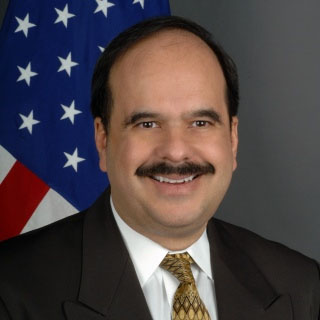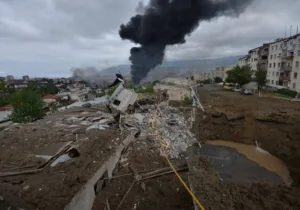On March 5th, Azerbaijani soldiers opened fire on Armenian police officers from the breakaway region of Nagorno-Karabakh (Artsakh to the Armenians), killing three and wounding one. This incident was only the latest in a months-long campaign by the Baku regime to ratchet up pressure, not only with Artsakh but along the border with Armenia proper.
Getting a lot more attention than the sniping and shooting has been a cruel blockade begun on December 12, 2022 by alleged Azerbaijan “eco-activists” blocking the only road connecting the Armenians of Artsakh and Armenia proper. The result has been food and medicine shortages and a bitter winter for Artsakh’s inhabitants who are also mostly cut off from the electric grid. On February 22, 2022, the International Court of Justice (ICJ) in The Hague ruled against Azerbaijan and ordered that the blockade in both directions of the Lachin Corridor road by Azerbaijan end. To date, Azerbaijan has ignored the decision.
Azerbaijan was able to impose this blockade because Russian peacekeepers allow them to do so. The Russians are there as part of a ceasefire agreement ending the Second Nagorno-Karabakh War. The same agreement, inked by Russia, Armenia and Azerbaijan in 2020, guarantees access along that now-blocked road. Although Russia is often portrayed as Armenia’s patron, the reality is more complicated. Russia’s largest oil company owns a 19.99% share of Azerbaijan’s largest natural gas field. It is not so surprising then that Armenians in Artsakh demonstrated against Russian inaction after the killings of their police officials.
Azerbaijan has timed this moment well. Russia is weakened by the war in Ukraine and wants to hedge its bets in the South Caucasus, making sure it retains some influence in Baku. Armenia under its earnest, bumbling Prime Minister Nikol Pashinyan seeks to distance himself from Russia and move towards the West. But the West itself is distracted by the Ukraine War and is also interested in cultivating ties with energy-rich Azerbaijan as a substitute for Russian oil and gas.
While President Biden and others in the West have sought to present their support for Ukraine as a noble struggle of democracy versus autocracy, the results away from the battlefield are somewhat contradictory. Rather than cowing authoritarians, the West’s campaign against Russian aggression has empowered a whole new crop of them – those agile and clever enough to try to leverage the West’s needs to stop Russia at all costs for their own cynical ends.
This phenomenon is not new, of course. During the Cold War, the West supported authoritarian regimes seen as necessary allies in the fight against the Soviet Union. In Spain, the subtle mind of Francisco Franco used anti-communism as a lever to get into the good graces of NATO and the United States. In our foreign policy, there are often urgent, priority interests that don’t exactly match those seemingly soaring, sweeping principles.
In late 1990, the United States gave Syrian dictator Hafez al-Assad the greenlight to crush remaining Lebanese Christian opposition to Syrian hegemony. Al-Assad had agreed to be part of the US-led coalition against Saddam Hussein’s conquest of Kuwait, providing additional Arab cover for Operation Desert Shield/Storm. At the time, nothing was more important to the U.S. than defeating Saddam. The Syrians knew this and were fortunate their Lebanese opponents included Michel Aoun, a blustering megalomaniac general who openly supported Iraq’s ruler. Syria’s near-total hegemony over Lebanon would last another 15 years.
Azerbaijan is not the only country to try to seize the political moment. Baku’s close ally Turkey has sought to do the same. And in seeking to curb Russia’s influence worldwide once the Russian invasion began, the United States has softened opposition to the regime in Venezuela so that they can pump more oil. Conversely, it tried to browbeat the Saudis and OPEC to pump more oil for the same reason: to deprive Russia of additional oil revenues.
In Sudan, the United States has pursued a policy of appeasement of the generals who overthrew a civilian government in 2021. Washington seems to be leaning towards the more Islamist faction of the military (SAF) which is supported by Egypt and against the anti-Islamist faction (General Dagalo’s RSF) which is supported by the UAE but which also has ties to Russia’s notorious Wagner private military company. Blocking Russia trumps everything else. The Biden Administration also spent most of its first two years trying to reward Iran – more Iranian oil on the market would have hurt Russia – before seemingly giving up as Iran ramped up its military relationship with Russia in late 2022.
So far, Azerbaijan has handled its campaign against Artsakh with great dexterity, with a strategy that can continue, be stopped and started again at will. A simmering, slow-motion humanitarian crisis, drive-by shootings of civilians and a few casualties among the Artsakh Armenian defense forces are not going to raise too many alarm bells while the West is distracted by the Ukrainian conflict. Secretary of State Blinken, who praised Armenia and Azerbaijan for taking “courageous steps” the month before the siege of Artsakh began, called for the immediate opening of the Lachin Corridor on January 23. To date, he has been ignored. The Artsakh Armenians did meet with the Azerbaijan side on February 24th and March 1st without a resolution. Azerbaijan reportedly threatened that continued defiance by the Nagorno-Karabakh Armenians will lead to “tougher and sharper steps.”
As the snows melt in the Southern Caucasus, Azerbaijan will soon face the eternal temptation of the seemingly clever authoritarians: how much can they get away with and how quickly, without drawing too much outside attention? Azerbaijan’s strongman, Ilham Aliyev, is in a position somewhat analogous to Putin in January 2022. The difference is that the Armenians of Artsakh, who are likely to fight to defend themselves, stand mostly alone, unlike Ukraine. If one goes by Aliyev’s incendiary rhetoric, the situation looks extremely volatile.
No one realistically expects that the United States is going to intervene to “save” the Armenians of Artsakh. That being the case, are the combined diplomatic efforts of American and Europe, feasting on Baku’s oil wealth, enough to prevent the violent ethnic cleansing of the inhabitants of this region on Joe Biden’s watch? We’ll know soon enough.







 Sponsor a student for Christianity & National Security 2024
Sponsor a student for Christianity & National Security 2024